Sean Jacobs's Blog, page 552
March 12, 2012
Now Soulja Boy takes on Joseph Kony
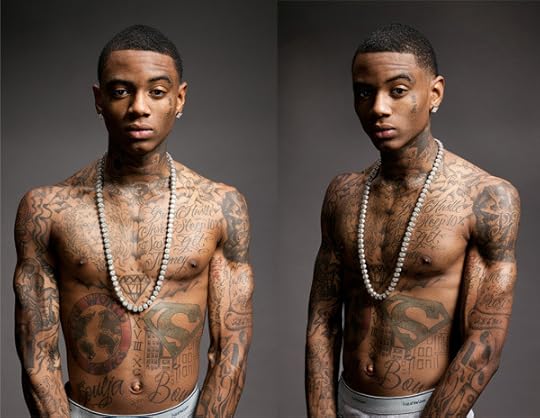
It has come to this. Musicians, especially rappers, had to wade in. Like everyone else who is now an expert on Uganda, they were quick to declare themselves on board with #Kony2012.* But some have taken it further. They had to release songs (already). You can imagine the deep thoughts encased within lyrics that had a whole 72 hours (at best) to be formulated. I woke up this morning to learn that Soulja Boy, who likes a fight (his last adversary was 80s rapper and now actor, Ice T), has thrown in his lot with Invisible Children and wants to "Stop Kony" (H/T: Palika Makam). If you want to be tortured, go listen here.
Hilarious and embarrassing. This is not even a song. It's like a monologue set to some vague drum beat. And he drops the word "swag" a few times.
Even more perplexing: why any other musician would want to shout out to such dead lyrics or music. But Soulja Boy's music has been used in the past by other musicians (yes, clearly not by him) to comment on war (that time, it was on child soldiers in Sierra Leone):
As I blogged at the time, in January 2010:
I don't have much time for the phenomenon that is Soulja Boy and his nonsensical lyrics. Like in "Turn My Swag On." But a German group, Die Orsons, took the song, slowed it down, gave it a acoustic feel, worked in some images from a short film, some CNN audio, an interview with former child soldier Ismael Beah, and made it into a protest/PR for a campaign about stopping child soldiers.
But back to the present.
Another rapper, Mistah F.A.B., has also made a Joseph Kony song ("Kony Freestyle"). He has better beats than Soulja, and at least his rhymes go with the music, but he can't help combining a valid critique with conspiracy theories ("it's all a Government ploy to get oil out of Uganda") and epithets.
Listen here.
* African musicians who were quick to uncritically post (their approval of) #Kony2012 were electro rapper Spoek Mathambo (who since took it down), The Very Best (who since took their support message down), Gazelle, Van Coke Cartel and many more.








Lucy Liu's Safari
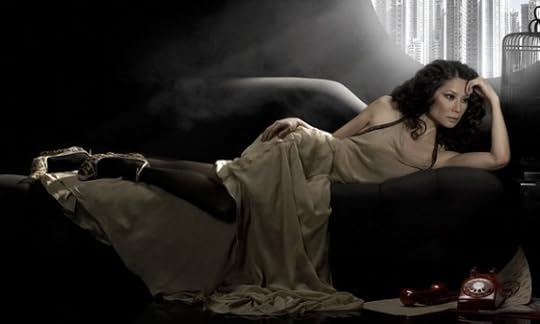
At the moment when Africa is once again reduced to a cesspool of panga-slashing child soldiers and the abode of the world's most dangerous man, a vanity piece on where Lucy Liu goes when she wants to get away (safari) is harmless enough.
As reported in February's Vanity Fair: "As befits a leading lady who's starred in such action-packed films as 'Charlie's Angels' and 'Kill Bill Vol. 1,' actress Liu—who is currently guest-starring in TNT's hit series 'Southland'—prefers vacations with a bit of adventure. [Here are] her tips for safari in Mozambique, Botswana, and beyond."
Liu and three friends went to "Singita Kruger Reserve along the South Africa-Mozambique border, Selinda Reserve, and Moremi Reserve in Botswana, Africa." This is where the Hollywood starlet goes when she "really want[s] to get away and have an adventure," with no shopping, no nightlife, no "reforming" Pilates machine (there's so much to say about the Medieval torture implied by the name of that Pilates fad machine, and why women are gaga over being "reformed", but that's another story). To Liu's credit, the inane questions about shopping, "on-the-go exercise routine," et al are asked by the VF reporter; I imagine Liu must supply an engaging answer.
It was also nice to know that Liu enjoyed good organic food, unadulterated by additives, flavoured only by salt, pepper, and olive oil. The only African human beings Ms. Liu and her three friends meet are the guides. When asked what her "favorite best-kept secret about an African safari is," she replies, "[g]uides and trackers. Ours were our teachers. We learned so much from them, and it was all about just learning to observe and listen. So simple."
Glad that the guides and trackers got props for their knowledge, and that she learned how to observe and listen. So simple.
* No, the photo, above, by Andrew Macpherson was not taken on safari. We can be grateful Ms Liu has left the "Africa" themed face paint behind her.








Ne-Yo trying to adopt "African children"
In this video, about a week old, American R&B singer Ne-Yo (if you don't know who he is) tells VLAD-TV (definition: "the TMZ of hip hop") that his wife is a "bleeding heart."








March 11, 2012
Djimon Hounsou's Africa
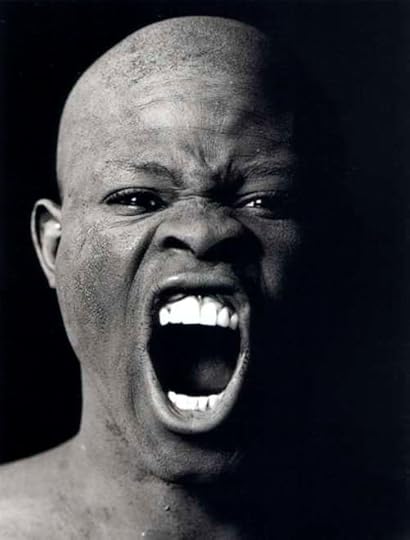
A couple of years ago, the Beninoise actor Djimon Hounsou collaborated with Kenyan writer Binyavanga Wainaina to put the latter's then provocative and now legendary essay "How to write about Africa" (which first appeared in Granta Magazine) on Youtube. In the essay, Binyavanga, who has since revisited the original essay, lampooned Western journalism and Hollywood's depiction of Africa and Africans. (I can't remember where I recently read Binyavanga saying that the American makers of the video changed the title to "How not to write about Africa" since Americans would not get irony and sarcasm, also insisting that Hounsou recite the text on camera to an "innocent" white child.) That video has resurfaced on some sites in the last month, and has been circulated by critics of the explosive and viral "Kony 2012″ video. But back to Hounsou: I've always wondered why Hounsou's acting choices have not been consistent with Binyavanga's critique.
Most famously, Hounsou starred with Leonardo DiCaprio in 'Blood Diamond' (2006), described by The New York Times as "a foolish thriller" and as "Rambo for liberals" by the Apollo Guide. The film is marketed as being about the civil war and diamond mining in Sierra Leone, but was really about the redemption of a white Rhodesian played by DiCaprio. Now comes the news that Hounsou will co-star with Orlando Bloom in what sounds like a Lethal Weapon buddy cop movie set in Cape Town. The film comes with the title 'Zulu'. I can see some of you already sniggering. Bloom and Hounsou play cops who have to hunt down the killer of the daughter of a member of the 1995 rugby World Cup winning team. Yes, snigger again.
The film is based on a novel by French writer Caryl Férey. It won a prize in France. The film's director will be another Frenchman Jerome Salle. One thing from the various descriptions of the novel and the film are the ridiculous names of the main characters which do not ring true. Hounsou's character is named "Ali Neuman". Part of Neuman's backstory is that he survived an attack by Inkatha, a movement which conducted a proxy war on behalf of the Apartheid government against black South Africans in the early 1990s. In the suburbs? Neuman now has to work with Bloom's character, "Brian Epkeen," to solve the murder of the rugby champion's daughter. Epkeen is described as "a free-wheeling white officer whose family was originally involved in the establishment of apartheid but who works well with Neuman." South Africa is described as "… a society struggling toward reconciliation." Yeh. In a now infamous interview about the novel Férey said some dumb things, so I am not sure what to expect from the film.
Anyway, here's the description from the film's IMDB site:
As a child, Ali Neuman narrowly escaped being murdered by Inkhata, a militant political party at war with Nelson Mandela's African National Congress. Only he and his mother survived the carnage of those years. But as with many survivors, the psychological scars remain. Today, Ali is chief of the homicide branch of the South African police in Cape Town. One of his staff is Brian Epkeen, a free-wheeling white officer whose family was originally involved in the establishment of apartheid but who works well with Neuman. Together they have to deal with crime that inevitably exists in sprawling areas of un -and under- employed people, crime exacerbated by gangs, both local and from other parts of Africa. Their job gets even more difficult when the corpses of two young women are found. A new evil has been introduced in the city and a new drug has been introduced to its residents, including both murder victims. At the chaotic crossroads where brutality and modernization collide, the echoes of apartheid still resound in the shadows of a society struggling toward reconciliation.








Dancing to the Lijadu Sisters
The music of the Lijadu Sisters can make the twins' fans do all sorts of things. What the people walking by were thinking we can only guess, but we do know this improvising fan (in Canada) got the attention of people in the second floor office (watch one minute into the song). One certainty about music: when it hits, you feel okay.








Tiken Jah Fakoly's identity politics
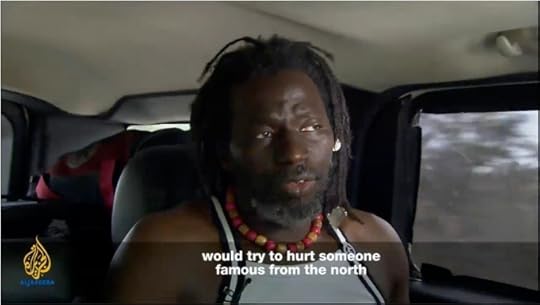
A few days ago, Al Jazeera English channel screened (and then put online) a 30 minute documentary, "The Power of Song," on the Ivorian reggae star Tiken Jah Fakoly. Made by a Canadian production company, the film was billed by Al Jazeera as following Fakoly on a visit to two village schools in Côte d'Ivoire that he funds (51% of Ivorians are illiterate). The publicity also emphasized generalities. Tiken Jah "fights for Africa's poor and marginalized." Al Jazeera also played up this quote uttered by Tiken Jah at the film's outset: "There's something wrong. Africa is one of the richest continents, yet the people who live on this continent are the world's poorest. That's a problem. We're living in a house of gold and we can't get medical care, we can't send our kids to school, we can't get enough to eat. That's the paradox, it's historical and no one can fix it except us. It is our unity that will allow us to overcome it." Not surprisingly, this was also how I learned about the film on twitter: it's about schools and Tiken Jah's general criticism of African corruption. But then I actually watched the film.Of course the film focuses on Tiken Jah's efforts around funding schools, but then about a third through the film, the narrator prompts Tiken Jah to talk about being forced to leave Abidjan, the capital in the south, when a civil war broke out in 2002. Part of the cause was the government refusal to allow a northern Muslim, Alassane Ouattara, to stand in presidential elections in 1995 and 2000 because he was allegedly not Ivorian enough. The 2002 civil war then split the country in two with the north controlled by rebels sympathetic to Ouattara. In the fim, Tiken Jah talks about how he realized that if he stayed in the capital, "the people in power in Abidjan would try to hurt someone famous from the north to lower morale in the rebel zone." The government also accused Tiken Jah of being "the musical branch of the revolution." Tiken Jah ended up fleeing and living in Bamako, Mali.
It is well known that Ouattara was eventually allowed to run in 2010. He won that election. The incumbent president Laurent Gbagbo refused to step down and a civil war broke out. Gbagbo was eventually arrested by rebel forces and extradited to The Hague.
The film also includes scenes where Tiken Jah discusses how he came to have his name, as well as a brief scene where an audience member at one of his concerts rains US$100 bills on Tiken Jah. The singer defiantly hands the cash to the audience to show that "he can't be bought."
Why should you care about all this? Well, apart from learning about Tiken Jah's place in Ivorian politics when you actually watch the film, it also makes me wonder about social media's ability to inform us and wonder whether people actually first watch or read half the stuff they then tweet and retweet.
* Btw, I can also recommend Siddhartha Mitter's interview with Tiken Jah in September 2011 in New York City.








World famous in South Africa
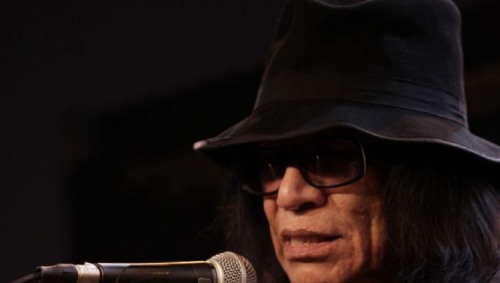
The history of popular music in South Africa continues to interest documentary filmmakers. Of recent offerings two films stand out: "Punk in Africa," about the history of the genre in Southern Africa since the 1970s, and Daniel Yon's film about jazz singer Sathima Benjamin, "Sathima's Windsong." I've just gotten word of "Searching for Sugar Man," about a 1970s Detroit-based Mexican American musician, Sixto Rodriguez, who was unknown at home, but became very famous among young white South Africans at the time. Rodriguez had staged his suicide on stage after he had released two albums with little popular success and had vanished from the music scene. Meanwhile, in South Africa, his music had developed a cult following, especially among white conscripts fighting Apartheid's wars in the late 1970s and throughout the 1980s. (It also turns out he was popular among suburban high school kids in South Africa the 1990s.) Below is an interview with director Malik Bendjelloul by Sundance TV around the time the film made its US debut and was picked up by Sony Classic Pictures (despite some critics' doubts ) for distribution:
AIAC blogger Tom tells me he had never heard of Rodriguez — that is, not before hanging out with former South African conscripts, mostly men in their early 40s (as part of his PhD project) but agrees with the director: Rodriguez' albums are masterpieces (at times on par with some of Bob Dylan's work). Here's Rodriguez playing 'Inner City Blues,' still, even after more than thirty years:








March 10, 2012
Paris a Continent … the Nike edition
We'll leave the close reading for another day (the relationship between identity politics and consumption for example), except to note that we know this is hardly mainstream France's idea of itself, i.e. accepting of difference and diversity.
By director Paul Geusebroek.








Music Break. Khuli Chana
The video for South African hip hop head Khuli Chana's 'Tswa Daar' comes with a nod to Craig Mack's Get Down. Have we already said DJ Raiko's beats (and writing) are underrated?








Louis Moholo's drum
On a recent trip to London I was hoping to catch a performance by Cape Town drummer Louis Moholo Moholo, the last surviving member of the famed jazz bands, The Blue Notes and The Brotherhood of Breath. Especially with the release of "Before the Wind Changes," a live recording of The Blue Notes on tour in Belgium in 1979. For the uninitiated, The Blue Notes, along with Abdullah Ibrahim and Hugh Masekela, defined South African jazz internationally for much of the period between 1960 and 1980. The band consisted of Chris McGregor on piano, Moholo-Moholo, Dudu Pukwana on alto sax and Johnny Dyani on bass. They left South Africa in the early 1960s after being invited to a jazz festival in France and became key players in Britain's jazz scene. Too bad I missed out. Meanwhile, while I am trying to get my hands on "Before the Wind Changes," I'll mine my iTunes library and substitute the real thing with Youtube videos like the 5-minute video above. It is footage of Moholo-Moholo (close to the camera on the right) and his quintet playing in London last year. Below is another video — 9 minutes long — filmed at a festival in London in 2010. Moholo (at the back on the left) with Ishmael Wadada Leo Smith and Steve Noble:
Finally, there's this interview filmed at the 2011 Pan African Space Station music festival in Cape Town with musician and composer, Neo Muyanga:








Sean Jacobs's Blog
- Sean Jacobs's profile
- 4 followers











